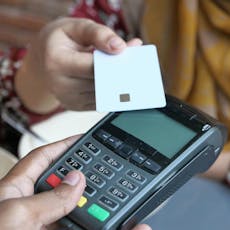Money transfer credit cards let you borrow money and transfer it from your credit card to your current account.
See which credit cards you're eligible for
Comparing won’t affect your credit score



By Matt Fernell, Editor-in-Chief at Finance.co.uk.

Money transfer cards allow you to move cash from a credit card into your bank account. Use our guide to learn how to use them and what to use them for.
We check your eligibility to show you the money transfer cards you’re likely to get so you can apply with confidence.
Get a decision and see deals in minutes
Compare money transfer cards from a range of top providers
Only see credit cards you’re eligible for
Check eligibility with no impact on your credit score
We use your information to perform a ‘soft check’ on your credit record to assess your eligibility, which means it has no impact on your credit score.
So we can find the best 0% money transfer credit card available to you, we need to know about your:
Income: Including your employment status, start date and annual income
Household details: Including your homeowner status, how much you pay towards rent or mortgage payments and your address
Personal information: Including your name, date of birth, number of dependents and contact details
To help you decide which card is right for you, there are a few things you need to consider:
The interest-free period: This is how long you have before you will be charged interest on your balance. This is typically between 6 and 12 months for money transfer cards.
The money transfer fee: This is the fee for transferring money from your card to your bank account. This can range from between 3% and 5% of the amount you transfer.
The revert-to interest rate: This is the interest rate you will be charged for any balance left on the card after the end of the interest-free period.
Additional fees: This can include charges for withdrawing cash, spending abroad, missing a payment or going over your credit limit.
Credit limit: This is how much you can transfer from the card to your bank. Most providers won’t allow you to transfer all of your credit limit, with most allowing you to use up to 90%.
Consider what you need most from your money transfer card to help you choose the right option. For example, if you think you’ll need as long as possible to repay the balance, look for the longest interest-free period.
However, if you want to keep the cost as low as possible, look for the card with the lowest transfer fee. As a general rule, the cards with the longest interest-free periods will charge a higher transfer fee.
Here's an in-depth look at how money transfer credit cards work.
There are several common reasons you might want a money transfer credit card, including:
Money transfer cards, especially ones offering a 0% interest period, are often used to clear expensive debts, such as overdrafts and loans.
For example, you could have a loan debt of £1,000 that’s occurring interest daily, which can seriously increase the cost of the loan over time.
To save money, you can use a money transfer credit card to pay off the loan in full to prevent interest building on your balance. You then repay the balance of the card without paying interest as long as it's all paid off within your 0% period.
0% money transfer cards can also help you pay for an expensive purchase, spreading the cost over your interest-free period.
For example, suppose you need extra cash for home improvements. In that case, you can transfer £2,000 from a money transfer card, plus a fee of £80 (4%), and then spread the £2,080 balance into more manageable monthly repayments of £173.34 during your 12-month interest-free period.
Money transfer cards can also be a good way to pay for services and products from businesses or self-employed individuals who don’t accept credit cards. Examples include wedding photographers, beauticians and musicians.
You can transfer what you need from your card into your bank account and then pay in cash, direct debit, or bank transfer.
To get the best deals with the longest interest-free periods, you will probably need to have a good or excellent credit score.
You may be ineligible for most money transfer cards if you have a below-average credit rating. If you are approved with a low credit rating, you'll likely be offered a higher interest rate and have a smaller credit limit, meaning you can't borrow as much.
To be eligible for a credit card, you will also need to:
Be a permanent UK resident
Be over 18 years old or over 21 with some providers
Have a steady income to show you can pay back what you spend
To build a credit rating that will help you access the best money transfer credit card deals, try some of these tips:
Checking your credit record is up to date and amending any errors
Registering to vote
Staying under 30% of your credit limit on any credit cards you have
Paying off your existing debts
Keeping current accounts, credit cards and other credit accounts open
Making your repayments on time
They can offer 0% interest for the first few months
You can use one to pay off high-interest debts
Money is moved directly into your current account
It is a cheap form of borrowing
They can charge a high interest rate if used for purchases
It will be costly if used for cash withdrawals
They usually offer a lower credit limit than other credit cards
You need an above-average credit rating to get one
Money transfer credit cards are a good option if you want to borrow money short-term at a low cost, but they may not suit every circumstance. Other options you can consider are:
A balance transfer credit card can help you reduce the cost of your credit card debt. They work by moving a balance from an existing credit card to one with a 0% introductory offer or a lower APR. Here's everything you need to know about how balance transfer credit cards work.
With a personal loan, you can borrow more than you can with a money transfer credit card and pay it back over a longer period of time. You're likely to be offered a higher APR, meaning you’ll pay more interest.
Personal loans can be helpful if you need a large amount of money, but they can be expensive. Find out more about how personal loans work here.
An overdraft allows you to borrow money via your current account, meaning you can use it to pay for purchases or direct debits. An overdraft can be helpful if you urgently need a small amount of cash as long as you can repay it quickly.
You'll be charged every time you enter your overdraft (unless you pre-arrange an overdraft with your bank), and the amount of interest you need to pay will grow daily until you repay it.
The information provided does not constitute financial advice, it’s always important to do your own research to ensure a financial product is right for your circumstances. If you’re unsure you should contact an independent financial advisor.
We're on a mission to improve the finances of the nation by helping you to spend wisely and save money



We're on a mission to improve the finances of the nation by helping you to spend wisely and save money



Once your money transfer is approved, the money usually arrives in your bank account within a week. It can take longer for some providers, and others may be able to complete the transfer sooner.
You can use your money transfer credit card to withdraw cash, but it’ll be expensive. Some credit cards will charge you for each cash withdrawal, and the amount you withdraw will build interest immediately, growing until it's repaid. This can make cash withdrawals expensive, especially if you take a long time to repay them.
Also, withdrawing cash on any type of credit card can harm your credit score, so you should avoid this.
Using a money transfer card won't affect your credit rating any differently than other credit cards. It shouldn't negatively affect your credit score as long as you keep up with your minimum repayments and pay off your debt.
Managing your credit card well could improve your score, although missing repayments consistently will harm your credit rating.
A balance transfer card transfers the debt you owe on one credit card to another. This usually costs a fee and is primarily used to move a balance building interest to another card with either a lower interest rate or no interest at all.
A money transfer card moves money from a credit card into your bank account.
Most lenders let you transfer most of your credit limit to your bank account, but ask that you leave a small percentage on the card. This is typically up to 95%, so if your credit limit is £3,000, you can transfer £2,850, leaving a limit of £150 on the card.
Most cards will also set a minimum amount you can transfer, which is usually around £100.
You can transfer money directly into your bank account with a money transfer credit card. This is the only type of credit card where you can do this.